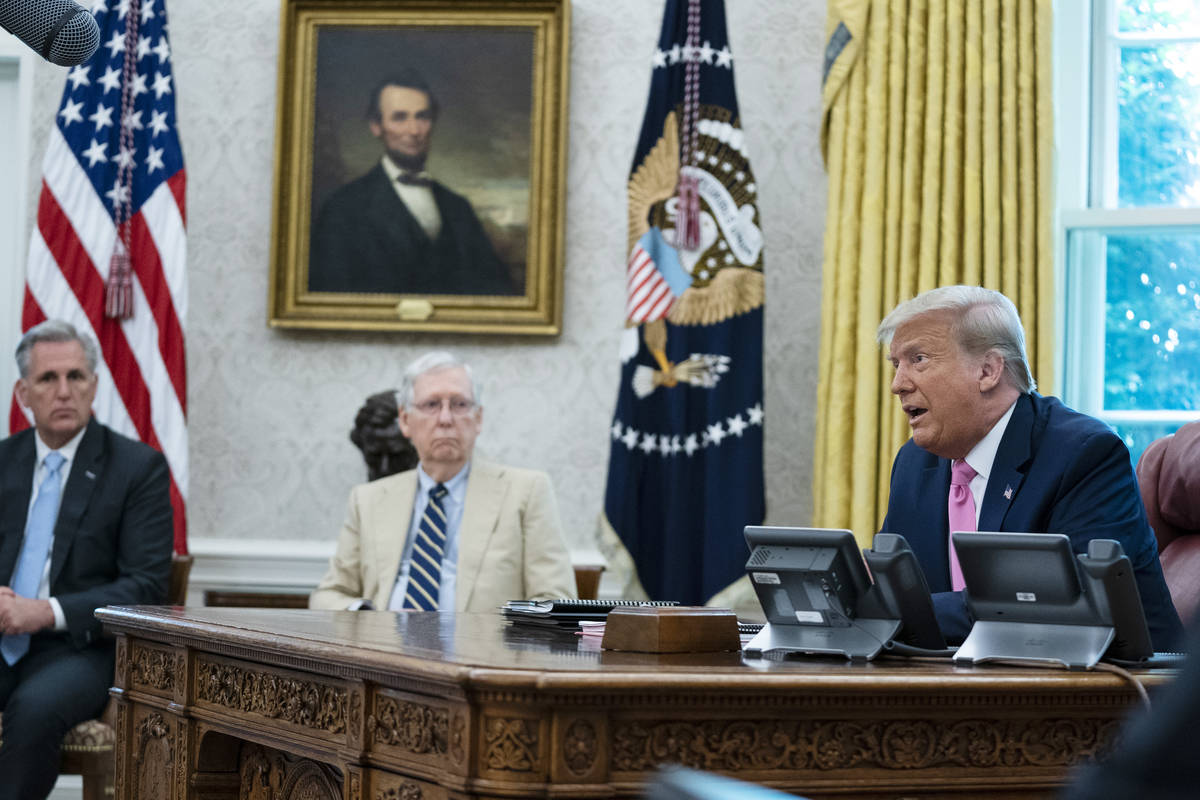Senate GOP leaders, White House confer on new coronavirus relief bill

WASHINGTON — Senate Republicans huddled with the White House on a $1 trillion coronavirus relief package Monday as lawmakers returned to empty Capitol Hill hallways.
Senate Majority Leader Mitch McConnell, R-Ky., was expected to roll out the GOP version of a coronavirus relief package as Democrats pushed a larger $3 trillion package passed by the House in May.
President Donald Trump met with Republican leaders at the White House where he outlined the focus of the GOP bill as “safety for this country, for our students, for our teachers, for our businesses.”
Trump claimed progress with trials for a vaccination, applauded U.S. production of ventilators and noted that America was not the only country grappling with a pandemic that has killed thousands of people across the globe.
“It’s a worldwide problem,” Trump said.
McConnell is expected to unveil a relief package that is vastly different from one passed in the House and that focuses on corporate liability protections and provides federal incentives to open schools. It also could include a payroll tax reduction.
“We’ll be putting forward a strong starting point for additional recovery legislation as soon as this week,” McConnell said on the Senate floor, adding that it would take bipartisan cooperation “to actually make that a law.”
Nevada Sens. Catherine Cortez Masto and Jacky Rosen backed Democratic leaders in the Senate calling for McConnell to take up the $3 trillion House version that includes $1 trillion in financial help to cities and states.
Nevada Gov. Steve Sisolak, a Democrat, is eyeing a second special legislative session as the state seeks federal assistance to address a $1.2 billion budget shortfall caused by the pandemic.
“We know our state will be challenged to provide the essential services Nevadans deserve in health care, education and so much more,” Sisolak said in a statement following the closing of a first-called special session in Carson City on Sunday.
Nevada is not alone.
The bipartisan National Governors Association and the bipartisan U.S. Conference of Mayors are seeking the federal aid and pressuring congressional lawmakers in both major political parties to provide relief to prevent layoffs and cuts in services.
Rosen and Cortez Masto signed on to a letter crafted by Senate Minority Leader Chuck Schumer, D-N.Y., who warned Monday that Democrats had the votes to block any legislation that lacked bipartisan input.
And Cortez Masto said she is advocating for legislation that would “ensure that the next coronavirus relief legislation includes more funding for state and local governments.”
McConnell has already called the $3 trillion House bill a nonstarter. Republican opposition in the Senate is mounting against the House bill, which extends an additional $600 unemployment benefit to those who lost jobs due to the pandemic. That aid is set to expire July 31.
States and cities are also seeking federal assistance to provide more testing and tracing, as well as aid to hospitals as COVID-19 cases spike in Las Vegas and other cities across the nation.
But Trump said in a Fox News interview on Sunday that there was no need for continued federal aid for testing, and the administration instead has focused on a payroll tax cut that House Speaker Nancy Pelosi, D-Ca., said months ago was a proposal dead on arrival in the House.
Pelosi, in an MSNBC inteview Monday, called the administration’s attempt to block money for testing and tracing “ignorance.”
The payroll tax cut, and absence of aid for more testing and tracing, also has threatened to split the GOP caucus in the Senate, with Republican lawmakers from politically competitive states and states seeing spikes in COVID-19 calling for aid.
And the Trump administration’s order to the Centers of Disease Control and Prevention to stop hospitals from reporting data about COVID-19 cases and deaths prompted a backlash in Congress.
Cortez Masto and Rosen joined other Democrats in urging the administration to reverse the order, which countered the advice of public health officials.
“In the midst of a global pandemic, these changes pose serious challenges to the nation’s response by increasing data management burden for hospitals, potentially delaying critical supply shipments, compromising access to key data for many states and reducing transparency for the public,” Cortez Masto and Rosen said in a letter to Labor Secretary Eugene Scalia.
Meanwhile, the Capitol remained void of tourists as tours for summer visitors continued to be banned and social distancing kept many legislative staffers working at home.
Contact Gary Martin at gmartin @reviewjournal.com or 202-662-7390. Follow @garymartindc on Twitter.